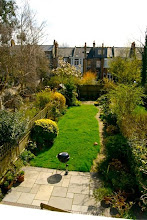
I've started writing a new column called 'Bibliotherapy', and the first one is published in Seven, in the Sunday Telegraph, today. I hope the title is self-explanatory -- I wanted to write about what to read at different times in one's life, in order to find some consoling words. Anyway, here it is, but if you read it on the Telegraph website, there should be a place where you can suggest your own ideas for future columns. All suggestions gratefully received!
There are times in one’s life when a good book – the right book – feels like a voice speaking in the darkness, or a hand reaching out from the past; providing solace when all else seems lost. Thus it was when I was 18, and heartbroken; awash with tearful misery until a friend’s mother gave me a second hand copy of “Dusty Answer”, Rosamond Lehmann’s coming-of-age classic that was first published in 1927. I devoured it overnight.
The title is taken from George Meredith’s poem, ‘Modern Love’ – ‘Ah, what a dusty answer gets the soul/ When hot for certainties in this our life!’ – and its themes, of passion betrayed and love lost, were to recur in Lehmann’s subsequent novels. All remain relevant now, especially in times of emotional turmoil; but her debut, telling the story of Judith Earle, and her passage from lovelorn adolescent to the verge of clear-sighted adulthood, has an emotional intensity that subsequent generations have recognised as their own, so that a myriad individual stories seem to be reflected within this book in particular.
Lehmann wrote “Dusty Answer” in her mid-twenties, when she was still young enough to remember the agony of a crushing rejection she’d received as a Cambridge undergraduate, from a handsome old Etonian who seemed on the verge of proposing to her after a whirlwind romance, but turned out to be engaged to another girl. In ‘Dusty Answer’, Judith falls for Roddy Fyfe – who is careless and inscrutable and irresistible – only to be discarded after a single, summer’s night of lovemaking. Over 80 years after the novel was written, Roddy’s callous dismissal is as recognisably cruel as any 21st century account of rejection; for when Judith confesses she has loved him ever since they were children, he responds with silence, and “a face as smooth and cold as a stone”.
Like the rest of us, Rosamond Lehmann went on to suffer other heartbreaks – most devastating of all was the end of her affair with the poet, Cecil Day Lewis, which is fictionalised in her later novel, ‘The Echoing Grove’. But the conclusion of her first book gives some consolation in its suggestion that heartbreak, however painful, can be a beginning, rather than a bitter ending. “She had nobody now except herself, and that was best… This was to be happy – this emptiness, this light uncoloured state… Soon she must begin to think: What next?”









13 comments:
Ooh, this is going to be a great column! Lovely work, Justine.
Cristina.
Thanks, Cristina. Which Bronte would you read as bibliotherapy?
A good first column, and a good idea for a series. I hope you'll continue to post the column, or provide a link, for those of us stuck in a land without the Sunday Telegraph!
I read Dusty Answer two years ago, in a lovely little Chatto & Windus Phoenix Library edition I picked up in a Warwick bookshop. I must say that, although I enjoyed it, it left me a bit emotionally drained. I read it as a 42-year old man, not as an 18-year old girl. I'm sure that made a difference!
It's definitely one that speaks to the 18 year old school girl, though I still find it compelling on re-reading -- but I think re-reading always brings with it the memories of who you were when you first read a book, which adds an emotional layer. So I don't know how it would feel to read it for the first time in my 40s -- emotionally draining, I suspect!
Hmmm... difficult question, and I might be a bit biased when I say Jane Eyre.
Cristina.
I love this idea of bibliotherapy Justine, on the Bronte side of things I would think of Tennant of Wildfell Hall for that breaking up out of a bad relationship and the chance of the new...
Yes, I was thinking of writing about The Tenant of Wildfell Hall for that very reason, and also because it's less well known than Jane Eyre or Wuthering Heights, and part of the point of the column (for me, at any rate), is to rescue good books that are in danger of being forgotten.
I love Tennant so much more than Jane...
I have never been in the position to need a book to help heartbreak (I don't know if this is an enviable position or not - I have a feeling it's rather sad!), but if I'm ever needing to bring myself out of a black dog day, I know I usually turn to Austen for consolation.
I saw Kathryn Sutherland at the weekend - she said to send her best wishes (she also gave me a blog task, I'd be interested to hear your views ...)
The new column sounds fabulous.
Thanks!
This sounds fabulous.
I know exactly what you mean when a book reaches out and takes you by the hand ( grabs you OR guides you ...whatever is needed)
It's amazing how on some occassions you pick exactly the right book, purely by accident ( or at least it appears so...!)
Yes -- when a book finds you, that's a kind of magic...
Post a Comment